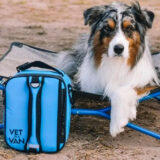Heat stress affects all species
Heat stress, or heat stroke, can develop quickly in pets in the warmer months, and can be life threatening. Over-strenuous exercise is the most common cause of overheating, usually in the warmer months, but it can happen in any weather if your pet is at increased risk. Heat stress is commonly recognised in dogs, specifically older, overweight, thick-coated, and brachycephalic (shorter nosed) dogs, such as Pugs, Bulldogs and Boxers, but rabbits are particularly sensitive to heat and all species are potentially susceptible. Even though reptiles like to bask, it’s only to reach their preferred body temperature then they will seek shade otherwise they can overheat.
Our pets don’t have the same ability to sweat like humans and rely on other methods to regulate their body temperature. Dogs pant, whilst cats sweat through their foot pads, seek out cool surfaces to lie quietly on and may pant if very hot. Rabbits regulate their body temperature via blood vessels in their ears and will lay outstretched. Reptiles seek out shade and cool surfaces.
Never leave your animal locked inside a car, caravan or tent without air-conditioning turned on. The temperature inside can rise rapidly beyond what your pet can cope with, even if it is parked in the shade with the windows down.
What signs should I watch for?
Signs of heat stress include excessive panting, bright red gums, vomiting, uncoordinated walking, lethargy, seizures, collapse, and unconsciousness which may result in death. If you suspect your pet is suffering from heat stress, immediately seek veterinary advice whilst you start cooling your pet with running water and a fan for a maximum of 10 minutes, if you are unable to reach a veterinary clinic within this time.
Here are some tips to help your pet keep cool during Summer or warmer weather:
- Provide extra bowls of water in case one is accidentally knocked over. A few outside for local wildlife is always a nice idea too.
- Freeze half a bowl of water overnight and add half a bowl of cool water before giving it to your pet.
- A frozen plastic water bottle collects external condensation which can be licked off during the day.
- Provide extra shade areas using shade cloths or sun umbrellas.
- Let your dog play in paddling pools filled with water, or a safe river or lake if you have one nearby. Just make sure they are always supervised.
- Never leave your pet in the car, even with the windows down. They could quickly be in trouble, as temperatures in a vehicle can rise to dangerous levels, even on mild days. Leaving the windows open, parking in the shade and tinting do not help to reduce the inside temperature significantly.
- Always walk your dog in the early morning or late evening when it’s cooler. Skipping a walk on very hot days may be safest. Be aware that pets can burn their foot pads on hot concrete too.
- Ensure your pet always has easy access to shade and water throughout the day. This is important for every species, no matter the temperature.
- Spray your pet bird with a mist pump spray bottle (only if he likes it!) or install a bird bath. Just make sure they are always supervised.
- Your snake or lizard may appreciate an extra cool water bath to soak in to cool down and keep them hydrated. Be sure they can hold their head above water, climb out if they want to, and are supervised.
- Check the temperatures of your reptile or amphibian enclosures, they can get too high if the room temperature increases so their heat lamp may not be needed for as long or at all on hot days.
- A ceramic tile or oven pan cooled in the fridge or freezer can be refreshing to lie on.
- Rabbits and guinea pigs will appreciate a cool wet face washer or tea towel to lie on, and you can help them by wiping down their ears with a damp cloth.
- Cooling mats and coats can help to provide some extra evaporative cooling, as does a wet towel to lie on.
- Allow any outdoor pets to come inside the house to share the air conditioning or electric fan (being careful they stay a safe distance away).
- Dogs, cats and ferrets who aren’t keen on drinking water may be convinced to lick a frozen bowl of diluted low salt chicken, beef or fish stock, or you can add extra water to their usual food, make rice a bit more soggy than usual or soak dry kibble. Rabbits and guinea pigs can increase their water intake by wetting their vegies or lightly misting their hay.
- If your dog is a breed with a short nose, tends to snore, pants excessively when exercising and prefers to breathe through their mouth, have a chat to your vet about possible surgical corrections that can be performed to reduce their risk of heat stress and breathing difficulty.
It is always helpful to have a Pet First Aid kit on hand in case of an emergency, check out the Vet in a Van – Navigator Pet First Aid Kit.
What other ideas have you tried for keeping your pet cool?
Share them with our community on Facebook or Instagram






